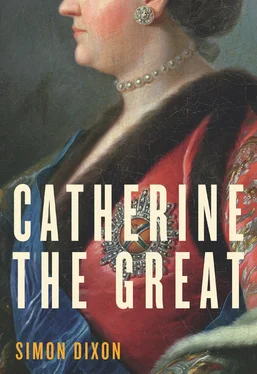* * *
Since religious ritual remained central to the life of every eighteenth-century monarchy, one of the paradoxical effects of Russia’s cultural Westernisation was to reinforce its role at the Court of St Petersburg. For many of Catherine’s courtiers, there was nothing offensive about that. ‘If I am not much mistaken,’ remarked the prescient William Richardson, ‘there are among them a greater number who affect indifference or disbelief in religious matters, than who really disbelieve. Perhaps, in times of sickness, disgrace, and low-spirits, they have more faith in St Nicholas, than in Voltaire.’ 113
It was different for Catherine herself: her cast of mind was wholly secular, and one reason why Father Platon felt the need to emphasise the difference between (true) spiritual enlightenment and (mere) secular learning was that he knew he was swimming against the prevailing intellectual tide. 114The empress had lionised Voltaire since reading him in the 1740s and made attempts to cultivate him as soon as she came to the throne. As she insisted from the start, they both had much to gain from the correspondence that began in the autumn of 1763 and continued until Voltaire’s death fifteen years later. While her association with him promised to enhance his status as a writer, ‘Our lady of St Petersburg’, as Voltaire later christened her, realised in turn that his approval could only enhance her reputation in Enlightened circles in Europe. 115If her letters gave her the chance to show off—‘Her conversation is brilliant’, Macartney remarked in 1766, ‘perhaps too brilliant for she loves to shine’—then they also gave her the chance to model her prose on one of the greatest stylists of her age. Frederick the Great declared that he liked ‘to maintain correspondences with superior minds, with people who are completely cerebral, as if they had no bodies; this is the human elite’. 116Catherine took a similar view, self-consciously representing herself as a writer with much to learn. She struck the same tone in her correspondence with Jean d’Alembert, the joint editor of the Encyclopédie , whom she attempted in vain to lure to Russia. ‘I have long owed a letter to Monsieur d’Alembert,’ the empress wrote to Mme Geoffrin, ‘and I beg you Madame to tell him that I shall shortly send him a notebook…I hope he will be pleased even though it is from the pen of a novice.’ 117
Realising the philosophes’ difficulties with the French censorship, Catherine tried to help them (and embarrass Louis XV) by offering to print the final volumes of the Encyclopédie in Riga even before her coronation. That invitation was refused, but it was impossible for its second impoverished editor, Denis Diderot, to turn down the empress’s subsequent offer to purchase his library for 15,000 livres and pay him to look after it for her. The completion of the deal apparently sent him into a state of stupor. Catherine was just as pleased. ‘I would never have believed that the purchase of a library would bring me so many compliments,’ she wrote disarmingly to Voltaire. ‘Everyone is paying me them for buying Monsieur Diderot’s. But admit, you to whom humanity owes a debt for the help you have given to innocence and virtue in the persons of the Calas family, that it would have been cruel and unjust to separate a scholar from his books.’ 118
Catherine realised very early on in their correspondence that it would be ‘very difficult’ to reduce Voltaire’s sparkling shafts of wisdom to a practical programme of reform. Philosophes who disagreed among themselves never offered a blueprint for government. 119Nevertheless, the Enlightenment was an important influence on Catherine’s legislation right from the start. Motivated primarily by the need for money, her secularisation of the monasteries was greeted with acclaim by philosophes who condemned the contemplative life as useless. Celibate monks and nuns were an obvious liability in a world which believed, quite wrongly, that the population had declined since classical times. Sharing the widespread perception that Russia was under-populated, Catherine sent the colonists recruited by the College of Guardianship to a huge new province of New Russia, stretching from the Polish border in the west to the Don Cossack territory in the east. Appointing Count Peter Rumyantsev as its Governor General in November 1764, the empress gave him characteristically explicit instructions in the sort of rational administration she expected:
First of all, you must proceed to learn about the province that has been entrusted to you in all of its conditions and confines, and, for this purpose, you are to obtain a reliable map of sufficient detail to indicate the location of regiments, towns, settlements, villages, outlying farms, seasonal work camps, monasteries, hermitages, manufactures, and any and all places of human habitation, as well as rivers, lakes, marshes, woods, farmland, steppes, roads, and the location of [all]… borders. 120
It was almost certainly the empress who initiated the essay competition set up by the Free Economic Society in November 1766 in the manner of the earlier one sponsored by the Academy of Dijon, which had prompted Rousseau’s first Discourse on the Sciences and the Arts . The topic she set was squarely linked to the Enlightened utility she had claimed as her watchword in a letter to Voltaire: ‘What is most useful for society—that the peasant should own land or only moveable property, and how far should his rights over the one or the other extend?’ It was the first public discussion in Russia of the question of serfdom. Of the 164 anonymous entries to the competition, only seven were in Russian. One was in Dutch, another in Swedish; the great majority were in German. Of the twenty French entries, one was by the philosophe Le Mercier de la Rivière, who made an unsuccessful visit to Russia, and another by Voltaire himself, under the motto ‘ si populus dives, rex dives ’ (if the people are rich, the king is rich). Voltaire also revealed to Catherine that he was the author of one of three essays submitted in Latin, under the motto ‘ ex tellure omnia ’ (everything from the land). Emancipation was the talk of the French salons. But it was all in vain. When the result of the competition was announced in April 1768, the prize-winning entry, duly published in Russian translation, was by the Frenchman Beardé de l’Abbaye, who was critical of serfdom, but advocated only a very gradual liberation of the serfs. 121
As the choice of Beardé’s essay signalled, Catherine was gradually beginning to realise the difficulties raised by her early reforms. When she first encouraged Eisen to contemplate a property-owning peasantry, she can hardly have grasped the extent to which Russia’s imperial expansion had been underwritten by the exploitation of unfree labour since the time of Peter the Great. Her other initiatives were scarcely less ambitious ventures, whose impact could only be judged over the long term. Many of their immediate results were questionable. More than four-fifths of the children admitted to the Moscow Foundling Home in 1764 were dead within a year, and in 1767 the mortality rate reached almost 99 per cent. 122Not surprisingly, Catherine lost confidence in the more extravagant of Betskoy’s schemes, leaving herself open to the charge that she failed to complete what she had begun, and invested only in her personal glory. 123That accusation was false. Having overcome two serious challenges to her authority—a plot among the Guards to restore Ivan VI to the throne in 1763, and a much more menacing attempt by the guardsman Mirovich to release Ivan from captivity while Catherine and her Court were at Reval in 1764—she embarked on her most ambitious project of all. ‘For the last two months,’ she told Madame Geoffrin at the end of March 1765, ‘I have spent three hours every morning working on the laws of this empire. It is an immense task.’ 124This was the origin of the great treatise which she intended to present to a new Legislative Commission in Moscow. By the time she was ready to convene it, there was nothing insecure about Catherine’s position on the throne. As if to prove it, while the greater part of the Russian political nation gathered in the old capital to prepare for the commission’s opening, she herself set sail on a voyage down the Volga to Kazan, a Muslim city 500 miles east of Moscow, conquered by Ivan the Terrible in 1552 as his ‘gateway to Siberia’.
Читать дальше












